A Drexell & Honeybee's Thanksgiving
The dawn before Thanksgiving broke lamb-soft over Brewton, the light filtering through a scrim of river mist that clung to the bottoms along Murder Creek. I watched it brighten, felt it warm the windshield. I told myself the day would be nothing more miraculous than a plate of turkey eaten among strangers. In the air hung that expectancy peculiar to holidays. Screen doors groan, dogs bark, small town code that grace was on the move.
Leaves skittered across the pavement like restless thoughts. Families are tucked away inside their houses. Ovens had already begun to warm, and tables set. Now began the ritual: generations mingling in cozy rooms. The thought comes thundering home: this is the fabric of intimacy from which I am distinctly separate.
I had received a few tentative invitations from kind souls met in passing—a preacher turned community spokesman and a pharmacist with a heart of gold—but they were heading out of town, drawn to larger family gatherings elsewhere. Their offers were warm but fleeting, like the pop of a spark that quickly fades in the night sky.
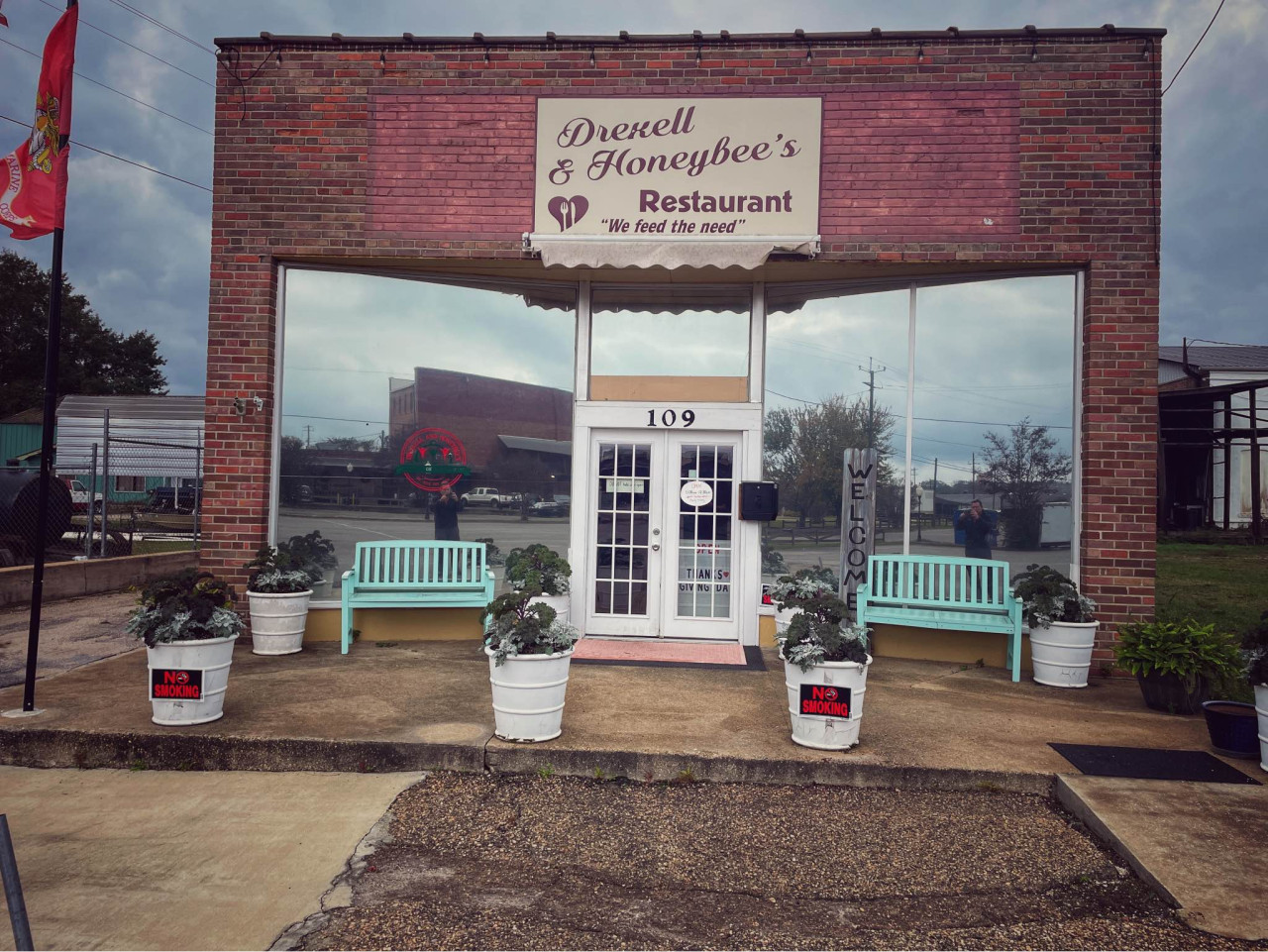
I needed company. Real, breathing, dish-clattering company—something to keep the ache at bay. All week locals had murmured about the “place that feeds folks for whatever they can spare,” but directions were offered in landmarks instead of street names: past the depot, turn where the big camellia grows, two doors down from the barber who whistles “Sweet Beulah Land.” I found it by following aroma alone—roasted turkey mingled with sweet potatoes glazed so dark they smelled of molasses and campfire.
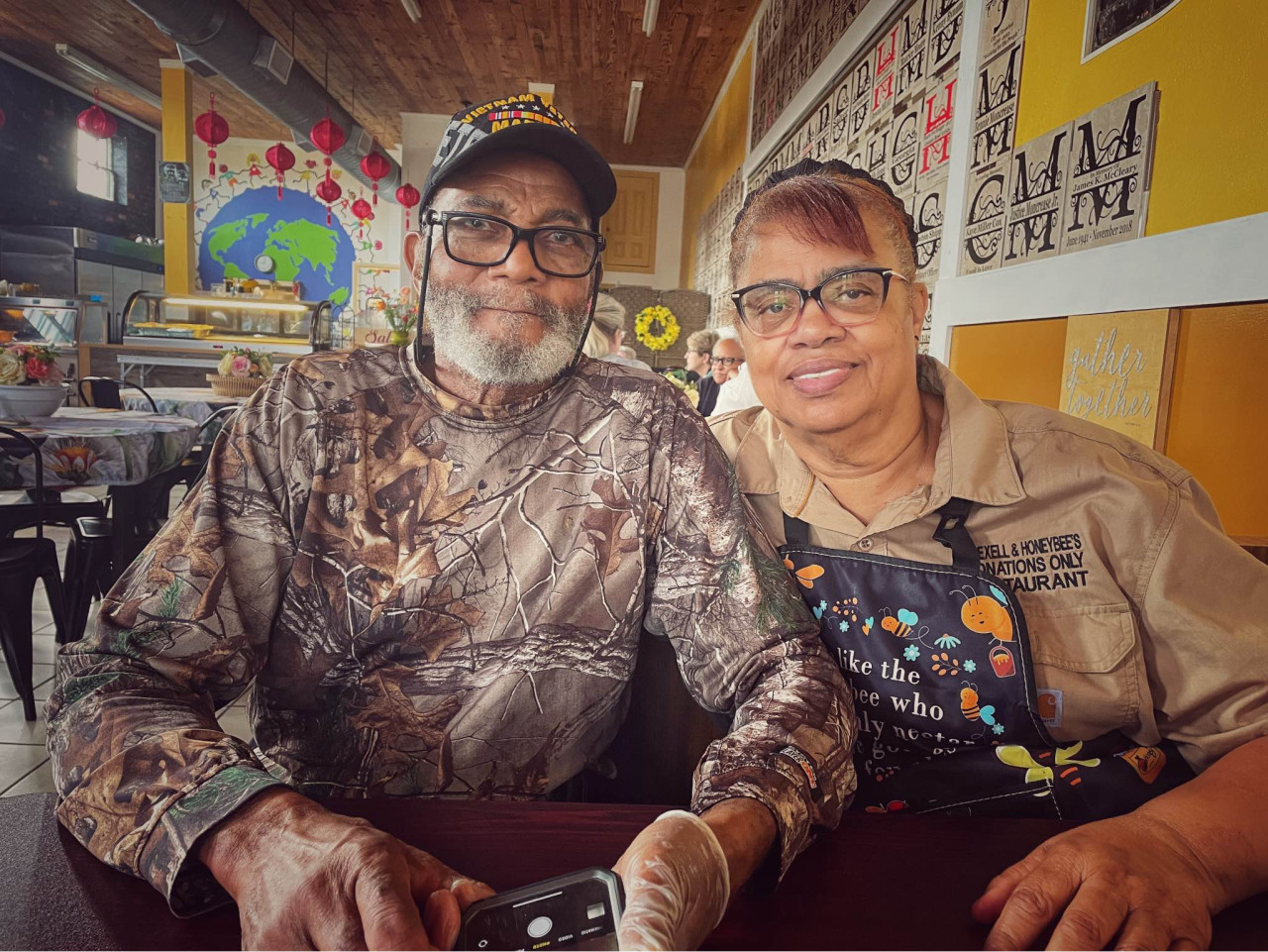
So, I've decided to partake in the community Thanksgiving at Drexell and Honeybee’s “donation only” restaurant, where the motto is, “Feed the need.” Here anyone can eat a restaurant-style meal without worrying about the check; no one gets a check. Ever. If you’re able and can afford it, a donation box sits unobtrusively in the back of the place where you can pay as little or as much as you want for the meal.
Drexell & Honeybee’s is a ribbon of old brick squared up between vacant lots. No neon, just a hand-painted sign the color of churned butter: FEED THE NEED.
Below the words, the front door is already flanked by a line of people. There are elderly couples with walkers, shift workers in high-viz jackets, and a pair of college kids whose backpacks suggested no kitchen of their own. The line bent around the corner and breathed little fog clouds into the cool air. Nobody grumbled at the twenty-minute wait because inside that building was warmth and the smell of childhood kitchens.
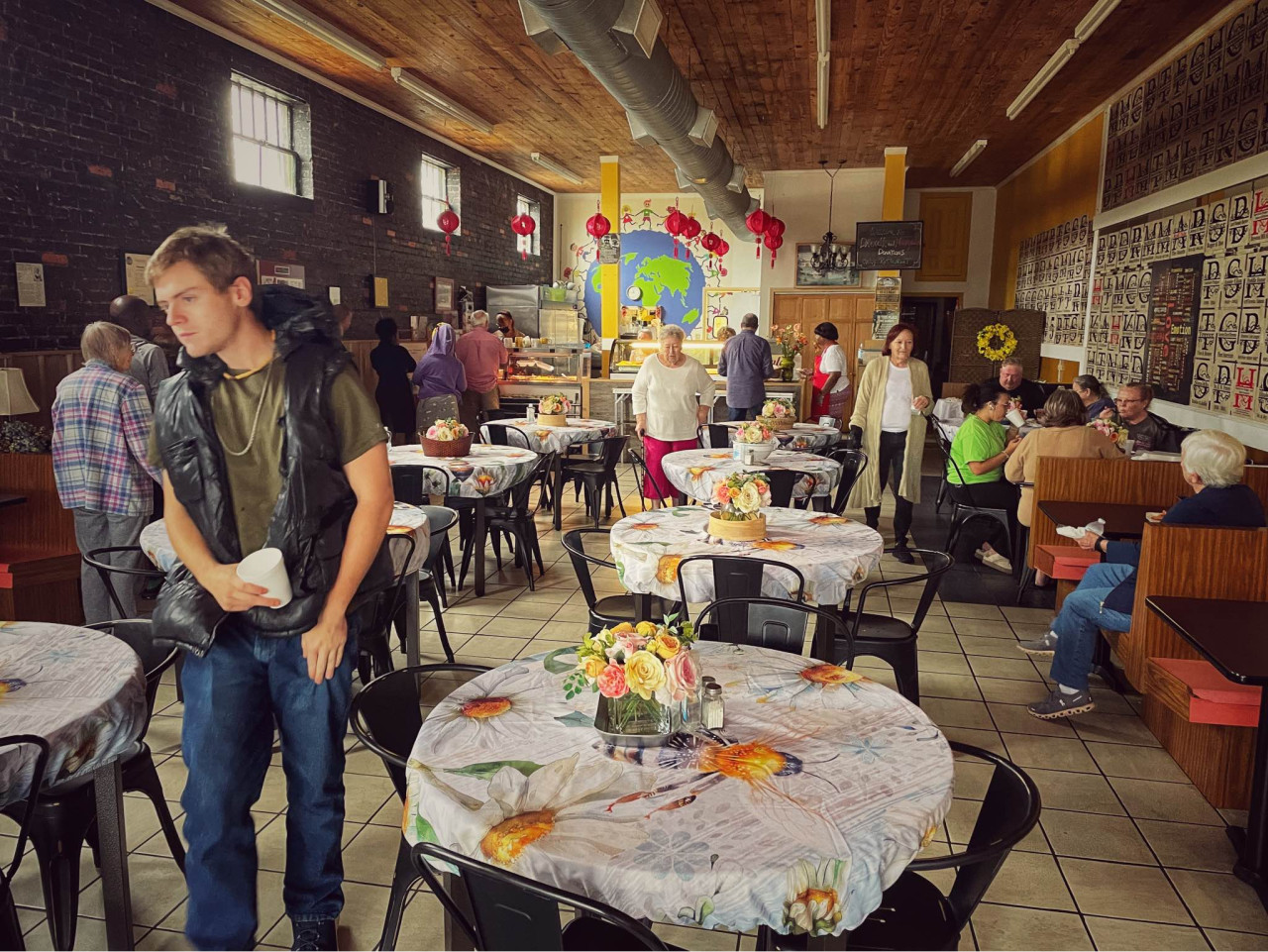
D&H was founded out of dreams and determination by Lisa Thomas-Macmillan and her husband, Freddie. But even before the restaurant they were involved in delivering hot meals to shut-ins. But Lisa felt like there was more she could do. She had always wanted to run a restaurant, but financially, that dream just wasn’t going to happen. That’s where Freddie stepped in. “He really is the one responsible for all this,” Lisa told me, and noted how it was Freddie’s retirement that allowed them to first set up shop.
The restaurant ate up about half their retirement savings, Lisa said. “And sometimes, only sometimes, do we have to dip back into the retirement accounts for the restaurant,” she said.
Meals are served from 11am until 2pm; however, I noticed a handwritten sign out front has amended those hours to 11am until 12:30pm “for the time being,” it says. Perhaps an indication of how expensive the place is to keep open.
Inside D&H looks like a thousand other small-town restaurants and cafes. Tables for four dot the interior, and booths for six line the perimeter. It’s decorated simple but tasteful, a nod to minimalist form and function. There’s even a small book-lending “library” at the rear of the place.
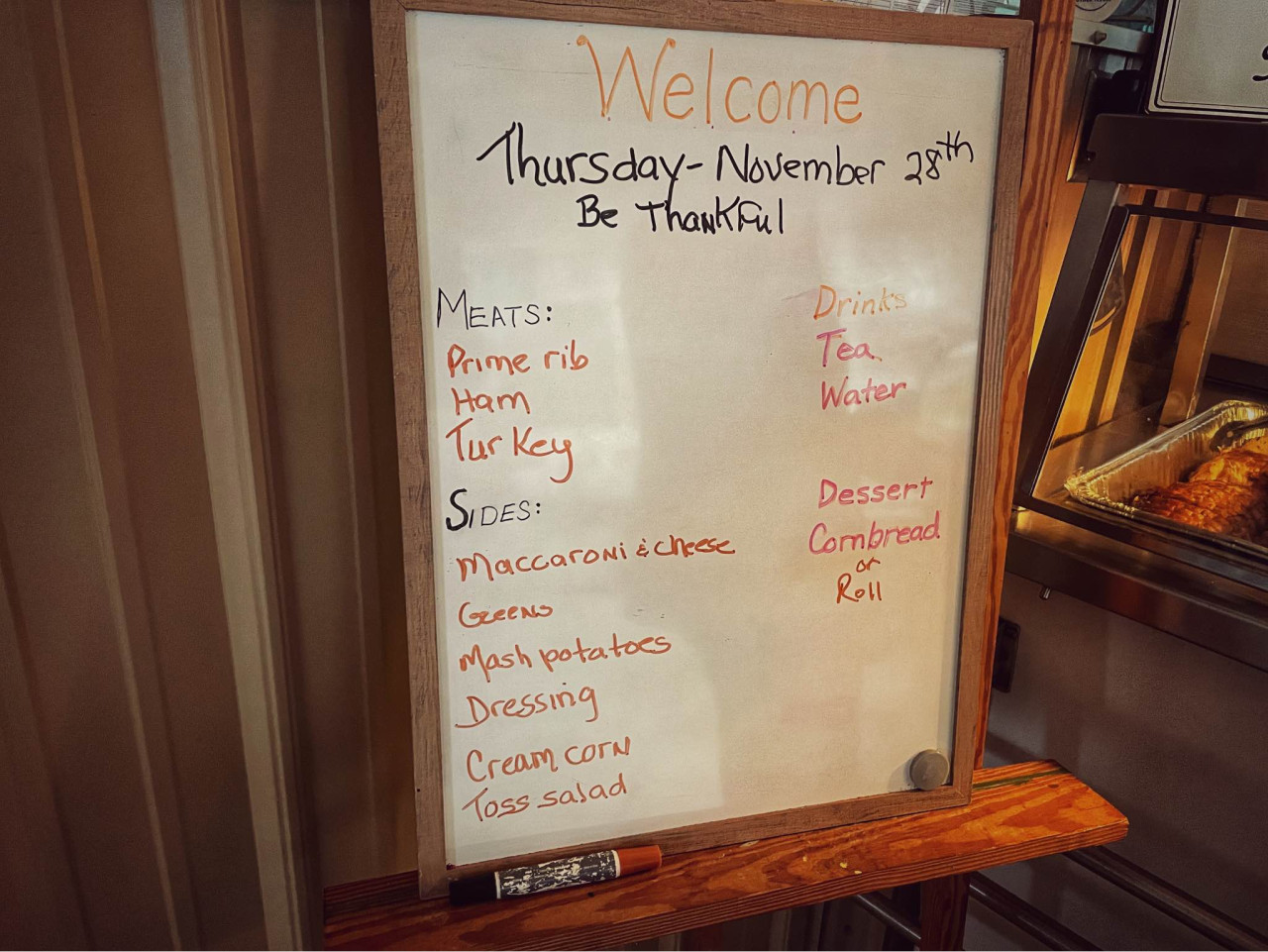
Although the food is the main focus, Lisa says, “People bring their problems here … they want to heard … they know they’ll find a sympathetic ear.” And, if for even five or ten minutes, “we can offer them a respite from the hurt, the worry or pain they’re feeling.”
The commitment of running D&H is extensive. The hours are long and the cost is high, says Lisa. “But this is our calling.”
At the rear an open window revealed the kitchen—an orchestration of well-worn stainless and women in aprons moving with quiet authority. A gray-haird woman, stocky as a stump, ladled giblet gravy while humming “Count Your Blessings.” Beside her a petite woman with chestnut braids stirred collards with a paddle that looked repurposed from a rowboat..
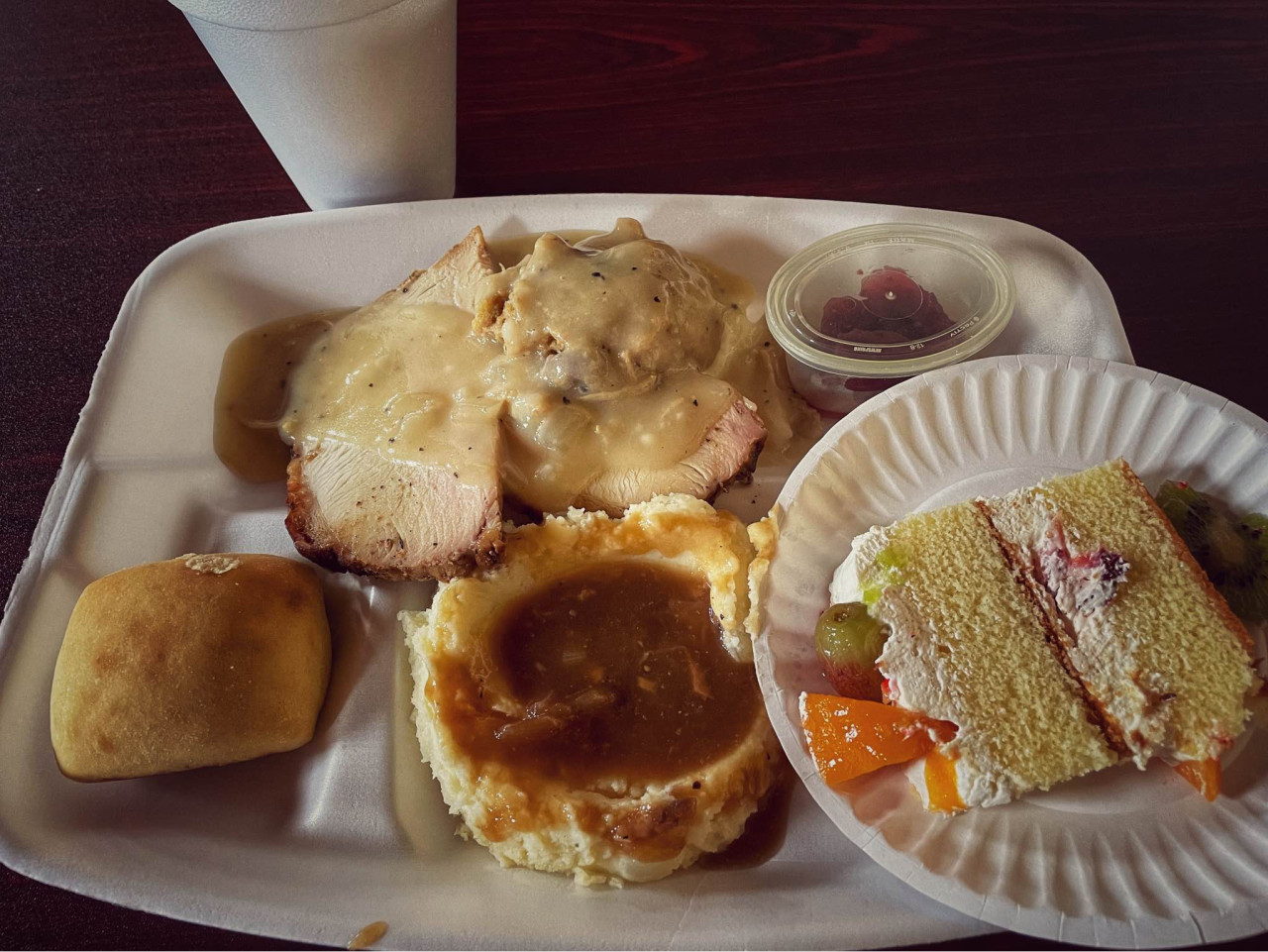
A volunteer in a crimson sweater motioned me toward a table already half filled. I carried my plate—turkey carved thick as paperback spines, dressing lumpy with cornbread, a fist-size biscuit shimmering under butter—and slipped into a chair. To my right an elderly Black woman confessed it was her first Thanksgiving without her husband of fifty-one years. Across from her a rail-thin retiree who’d recently lost his pension dabbed hot-sauce tears from a chin scarred by offshore weld work. We shared names, small histories, more silence than chatter, yet the silence wasn’t empty; it had heft, like a worn quilt passed down a pew.
Halfway through seconds of pecan pie the crowd began to thin, bellies filled, paper plates stacked, embraces traded at the door. I waited until only a handful of volunteers remained wiping tables with vinegar cloths. Then I stood, heart thundering in that ridiculous way it does whenever generosity threatens to out itself, and walked to the serving window. Lisa rested her forearms on the ledge, flour dust whitening the hairs.
“Ma’am, could I trouble you for a word?”
She looked up and the exhaustion behind her kind eyes nearly undid me. “Sure, hon, let me fetch Freddie.”
I shook my head. “Not about the food—though it was glorious.”
I introduce myself, hand her my card. See reads off “Hope and Generosity Tour,” with a question mark in there somewhere, “well that’s an awful nice sentiment,” she says. I ask if I can have a few more moments of her time, though visibly weary from the day’s meal preparation, she agrees.
“I just have a few questions,” I say. “How many people were you prepared to feed today?”
“That would be 120,” she says with the precision of a seasoned chef.
“Well, if someone, say, walked through that door right now, and, oh, I don’t know, say they gave you $1,000. What would that do for you?”
Lisa was at a loss for words. “It would do a lot for us,” she finally said; it would definitely pay for everyone’s meal today.
“Well… I’m not going to get up and walk back through the door, but here… I’d like you to have this $1,000 in cash. I’d like to pay for everyone’s Thanksgiving meal today,” I said.
More silence, then astonished looks and finally, tears. “This has never happened to me before,” Lisa said. “Oh my, my… this is my most memorable Thanksgiving ever!” she said.
I said my good-byes, and her eyes teared up again. “Oh… I just don’t want you to go,” she said. “This was SO kind of you. Please be safe in your travels.”
Freddie appeared, wiping gravy from his wrist, and Lisa pressed the cash into his hands. He counted without counting, eyes glazing. The two of them leaned into each other, and a knot in the center of their chests had cracked loose.
We prayed—spontaneous, unpolished words—and when amen softened into silence, Lisa placed both her floury hands on my cheeks like a mother blessing a child. “Safe miles, friend.”
Outside, afternoon light slanted amber through the pines, staining Main Street with long stripes. I walked until I found the railroad bench again. The turkey warmth in my stomach mingled with something lighter: the recognition that generosity doesn’t erase loneliness, but it does dilute it, the way creek water sweetens when two streams converge.
A caboose rolled past, its rusted couplers knocking out a rhythm older than jazz. I thought about the woman spending her first Thanksgiving alone after her husband of 51-years had past, about Lisa’s paddle pushing collards, and about the anonymous bills now cushioned. Thread by thread, strangers had woven a tapestry sturdy enough to sit on, maybe even strong enough to carry a man the next hundred miles.
Night came early, as southern winter nights do. Then Josie and I—and the memory of every plate paid for inside Drexell & Honeybee’s—eased into the dark, taillights flickering red against the trunks of pine that have stood a century and will likely stand another. Somewhere behind us, Lisa flipped the OPEN sign to CLOSED, counted blessings instead of receipts, and planned tomorrow’s menu with a bit less worry.
And I understood that gratitude is not a destination, but a fuel—slow-burning, octane of the soul.
When you subscribe to the blog, we will send you an e-mail when there are new updates on the site so you wouldn't miss them.

